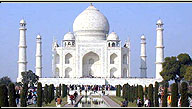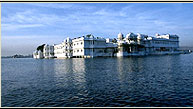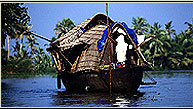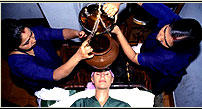-| Archaeology | -
Introduction
Indian Prehistory spans back to the very beginning of the human evolution. The
earliest traces of human existence dates back to the period between 400,000
- 200,000 BC The evidences of this age are found in the form of large number
of Pre- Historic tools at various sites in Soan Valley in North India. The earliest
traces of modern humans (Homo Sapiens) in India goes back to around 36,000 BC.
The age of primitive man (Paleolithic Age) lasted till 8,000 BC From this age
began the Mesolithic age that continued till 4,000 BC It is during this age
that the first usage of pottery came into existence .It is the beginning of
domestication of plants animals. Man started living in oval or circular huts
.
The Chalcolithic Age (1800 - 1000 BC)is also known as Bronze Age, during which
metals like bronze and copper were used to make the tools & implements .
This is the formative period of Indian Proto History which includes the Indus
Valley Civilization or Indus-Saraswati civilization; one of the oldest Civilization
in the world. During this period well planned town complexes were constructed
with all sanitation facilities and well protected with defense system to protect
the population both from floods & invasions.
This period was followed by what is been called as the dark age, During which
wooden structures came into existence but couldn't survive the ravages of the
time. This is followed by the Iron Age where the use of Iron started for the
manufacture of tools & implements.
This age lead to the agricultural revolution & has far reaching effects on social,
economic & religious history of this country. All these development took place
at different times simultaneously with some time gap because of the vast geographical
setting of the country which is also known as the "Indian Sub Continent". During
this period the religious upheaval began in the form of Birth of Jainism & Buddhism
which are contemporary to other religious movement started in the parts of Europe
& Asia.
The History of this subcontinent started in the form of written records now
found in Chinese travelers accounts.
This is the age when cultural history of this subcontinent started mingling
with the other parts of the world with beginning of inland & sea trade. The
first Golden age of this country started with the birth of Mauryan Dynasty &
followed by Shunga, Kushan & Gupta Periods merging into the early Mediaeval
period which was a formative age for both Buddhism & Hinduism religions.
The end of 12th century was greatly influenced by the annexations of the northern
part of the country by the Muslims. This has greatly changed the social & religious
condition of the country, This lead to the beginning of the Muslim rule in India
which influenced the art & architecture of the country with Indo Islamic edifices
having vast variety of building in the form of tombs,mosques & palaces.
This lasted up to the middle of the 19th century when the British Supremacy
annexed the country on the pretext of trading.
Finally it was in the middle of the 20th century, the country got liberated
from the British rule in 1947. The Diverse cultural, social & religious conditions
germinated the largest number of monuments in the world. Beginning from the
3rd millennium BC onwards. The rich culture heritage of this country provide
the view of all the major religions of the earth ( Hinduism,Buddhism, Jainism,Islam,Sikhism
& Christianity) which are not found in a single country except India.
The rich cultural Heritage of this country was rediscovered & studied during
the British rule in India & the importance of preserving this heritage was initiated
by Gen Cunninghum who established Archaeological Survey of India in 1862.& is
popularly known "the Father of Indian Archeology" who himself has been credited
surveying of North western part of India & discovered thousands of Monuments
& sites of immense Archeological Importance.
Ever since form that period Hundreds of sites have been excavated by ASI ranging
from 3rd millennium BC onwards. This project is started to bring the world closer
to this extremely rich & ancient heritage which is only often available in the
books, this project provides a rare opportunity to have firsthand & closer look
to the grand archeological wealth of this country by the way of visiting different
ancient archeological site during the excavations work in progress while the
field season. That means these tours will provide real opportunity to see &
feel the past.
More Archaeology Site ::
» Buddhist
» Chalcolithic
» Early-historical
» Harrapan
» Pre-historical
Archaeology in India Reservation
Form



